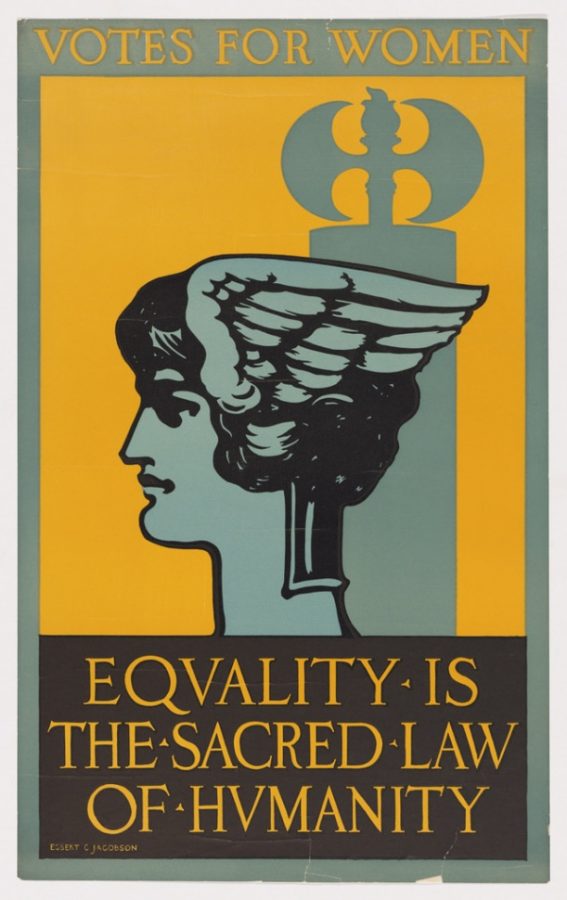Hey Alexa, play “Run the World (Girls)” by Beyoncé: a brief history of Women’s History Month
Women’s History Month is more than learning about the past; it’s also a celebration of womanhood today
March 6, 2021
This March celebrates the 39th year of uplifting and educating people about inspirational women throughout American history. The whole month shines a spotlight on women from various backgrounds and ages. However, the empowering month-long holiday wasn’t always 31 days; in fact, it used to be just 24 hours.
In 1911, the world devoted March 8 to be International Women’s Day. The celebration “is a global day celebrating the social, economic, cultural and political achievements of women,” according to the International Women’s Day website. “The day also marks a call to action for accelerating women’s equality.”
Several years later, groups across the nation began celebrating Women’s History Week. A prominent celebration occurred in Santa Rosa, California, which was organized by the Education Task Force of the Sonoma County Commission on the Status of Women in 1978. The movement inspired other people across the country to hold their own celebrations. Eventually, President Jimmy Carter allowed a formal observance on the week of March 8 in 1980.
People soon recognized Women’s History Week as a time to showcase female achievements and strive for equality for women. In the year of 1987, the whole country looked upon the entire month of March as National Women’s History Month. Many women feel a sense of gratitude for their ancestors and past influential women in America throughout the month of March.
“Women’s History Month to me is when the contributions of women in history are acknowledged,” said Junior Ayannah Corvil. “Women are usually excluded, so knowing that there is a month that acknowledges them is so important.”
There are thousands of overlooked female figures in American history because of the country’s highly patriarchal society. For example, at the 1948 Olympics, Alice Coachman won the high jump for the United States. In addition, she became the first black woman to win an Olympic Gold medal for the country in that event. Her victory resulted in her meeting with King George VI and President Harry S. Truman.
In addition to learning about history’s lesser known important women, many students take the time to examine the contributions of women to political and social life in America. “I celebrate Women’s History Month by learning and listening,” junior Enise Kupa said. “I learn about the women who made waves in our society, like women suffragists such as Elizabeth Cady Stanton and Susan B. Anthony.”
2021 marks the 100th anniversary of women’s suffrage in the United States, and this year’s theme is “Valiant Women of the Vote: Refusing to be Silenced.” Women have been fighting for equal rights for hundreds of years (and many would argue that the fight continues and likely will into the future). It can be as small as demanding respect from peers or major like advocating for equal pay within a workplace. Many women in the local community do not have to look far to admire a female figure.
“My main inspiration is my mother; not only because she is my mother, but because when I step aside and look at how hard my mom works to raise me as a single mother, I really applaud her,” Corvil said. “She has never given up and has grown as an individual.”
There are several different versions of defining the term ‘woman’ in society. People can clearly define women by stating the obvious, such as distinctive features, vocal tone, or taking over domestic tasks. However, classifying the term ‘woman’ today goes much further than traditional definitions. The term has become loaded with different social, cultural and political meanings.
Several publications, like the Queens Journal of Queen’s University in Ontario, Canada, poll students and community members about what it means to be a woman in 2021. “Being a woman means being able to be powerful and assertive, yet kind at the same time,”Anna Logan stated in Queens Journal. “It means being compassionate and vulnerable towards those we love in our lives without feeling weak for doing so. It means striving for our goals even in the face of the adversity we may encounter along the way.”
Women’s History Month is a historic 31 days, 744 hours, 44640 minutes and 2678400 seconds. Many believe it is crucial for people around the world to take time out and educate themselves on women who altered history for the better.
“An act as simple as reading an article or watching a documentary can foster a deep sense of appreciation, and that appreciation can extend to inspiration for our generation today,” said Kupa.







